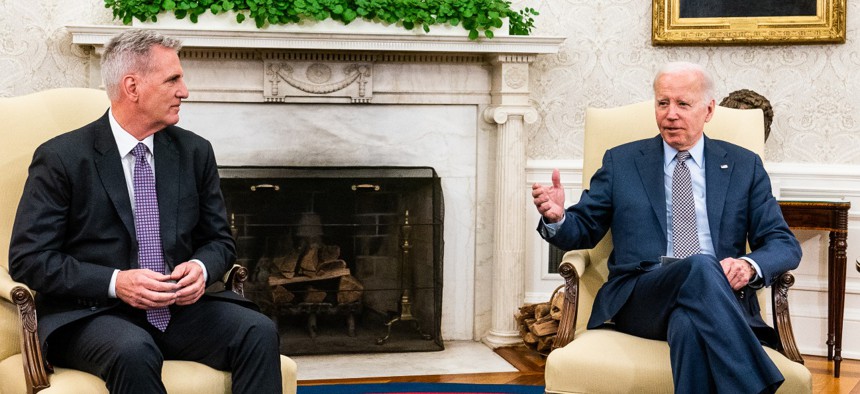
President Biden meets with House Speaker Kevin McCarthy in the Oval Office of the White House on May 22. The two sides appeared closer to a deal on the debt limit on Thursday. Demetrius Freeman/The Washington Post via Getty Images
With Days Until Feds Could Miss Paychecks, White House and Republicans Inch Closer to Averting a Default
The gap between the two sides is narrowing.
Negotiators looking to strike a bipartisan deal that would avoid a default that could cripple government operations expressed more optimism on Thursday than in days past as they rush to reach an agreement before a potential June 1 deadline.
While not yet announcing an overall breakthrough, key lawmakers signaled they had scaled back the contents of a compromise and come up with some creative measures to bridge their differences. Talks went late into the night Wednesday and resumed during the day Thursday. Unlike in prior days, there was little talk among the key players of setbacks or the two sides remaining far apart.
In another positive sign that the White House and House Republicans were trending toward a deal, outlines of some provisions of the potential agreement began leaking to rank-and-file members. According to multiple reports, the two sides have closed the gap on the top-line funding level for fiscal 2024. President Biden on Thursday confirmed that he offered to freeze spending at federal agencies, a proposal Republicans have rejected as part of their demands for cuts.
The White House has reportedly offered to siphon away some of the $80 billion in new funding for the Internal Revenue Service—provided as part of the Inflation Reduction Act—and put it toward spending at other agencies. House Speaker Kevin McCarthy, R-Calif., said earlier this week he would not put a bill on the floor unless it reduced spending next fiscal year compared to current spending levels.
On Thursday, McCarthy told reporters that not everyone was “going to be happy” with the end result—signaling that a deal was within reach. Biden added his and McCarthy’s teams were “making progress.” White House Press Secretary Karine Jean-Pierre said “there continues to be a path forward” toward a deal.
Rep. Kevin Hern, R-Okla., told Reuters a deal was likely to be struck by Friday. The two sides are expected to detail a spending level for the Pentagon, but leave the specific non-defense discretionary spending levels for the rest of federal agencies up to congressional appropriators to negotiate.
If an agreement is reached, Congress could still face some resistance before Biden can sign it into law.
Conservative Republicans in the House Freedom Caucus preemptively derided the deal, saying McCarthy had given away too much. Instead, they said in a letter, Republicans should make new demands related to border security and repealing all $80 billion of the IRS’ Inflation Reduction Act money. House Minority Leader Hakeem Jeffries, D-N.Y., meanwhile, told reporters that McCarthy should not necessarily count on Democrats to support whatever deal he strikes with Biden.
Treasury Department Secretary Janet Yellen said earlier this month the government could default on its debts as soon as June 1, and subsequently said it was highly unlikely the Treasury could continue paying the government’s bills past early June. Lawmakers have warned it will take more than a week to write, pass and send the White House a bill once a deal is struck, leaving in question whether Congress can still act in time. Sen. Mike Lee, R-Utah, on Thursday threatened to use legislative procedures to slow down the passage of any deal that does not sufficiently cut spending.
Biden on Thursday warned of the consequences of a debt default, which would most likely force federal employees to face delayed paychecks and, potentially, furloughs.
“The American people deserve to know that their Social Security payments will be there, that veterans’ hospitals remain open and that economic progress will be made and we’re going to continue to make it,” the president said.
Treasury Department officials have suggested a default would require the government to delay all payments until it had enough money available to meet the demands of a given day. Agency payments to beneficiaries, states, grantees, contractors and their own employees would be disrupted.







